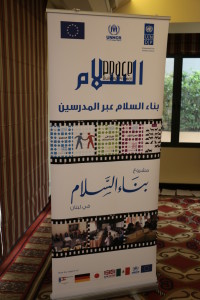In a contract with the UNDP, in its project titled “Integrating Peace Building into Educational Channels”; …For Development and Center for Active Citizenship set out to integrate peace building into formal and non-formal educational channels in Lebanese schools in Beirut Suburbs and Bekaa. The project tackled the gaps in knowledge, attitudes and practices of the students through training and capacity building of educators and nurtured a cultured of joint planning and execution of shared initiatives.
The school selection was undertaken together with the UNDP, Ministry of Education and Higher Education and UNHCR to determine priority locations based on updated information, including the relative mix of Lebanese and Syrian refugee students.
The project came in three phases:
Phase I of the project was The Tripartite Committee.
In phase I, a combined group was formed, composed of parents, students, teachers and school administration, in 15 schools from Bekaa. These groups are aimed at identifying the forms of violent behavior and forms of conflicts in the school until they can identify a basket of activities and projects that can help in ending the violence in schools.
15 meetings were held with the teaching staff of the 15 targeted schools on effective and positive ways that deal with the issue of students and violence.
15 meetings were held with parents of students from the 15 targeted schools on positive and violence free methods of interaction with the students.
A code of conduct was developed for each of the 15 schools in a participatory manner (with parents, students and staff (educational and administrative).
Phase II of the project was The Educator’s Workshop.
In phase II, teachers and supervisors from 14 different schools from the eastern and southern suburbs of Beirut, were trained on ways, tools and activities that are meant to help in managing conflicts and decreasing violence in the schools.
In addition to this training workshop, the blue prints of a big project aimed at spreading the culture of peace in all targeted schools was developed.
Phase III of the project was The Big Game.
In phase III, a big activity (in the form of big games), was implemented with the students in each of the 15 targeted schools. The game was aimed at raising awareness of the importance of diversity and the values of tolerance, acceptance, non-discrimination and non-violence.
The game consists of three posts situated in three different places in the schools with some difference and no direct visual communication. Each post has a theme related to one of the following topics: acceptance of difference and non-discrimination, social economic rights, and renouncing of violence. Students are divided into three groups equal in numbers. Each group is assigned a color through colored ribbon around the hand of each student.
Groups have to answer questions and solve riddles the quickest possible in a cooperative way by moving sequentially from one post to the other. Questions and riddles are obviously related to topics mentioned above.

